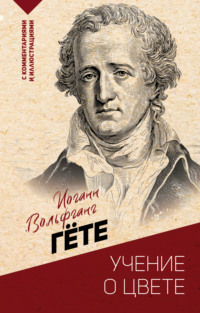 полная версия
полная версияThe Sorrows of Young Werther
"I should be glad to hear one," said Charlotte: "at least, I think very much depends upon ourselves; I know it is so with me. When anything annoys me, and disturbs my temper, I hasten into the garden, hum a couple of country dances, and it is all right with me directly." "That is what I meant," I replied; "ill-humour resembles indolence: it is natural to us; but if once we have courage to exert ourselves, we find our work run fresh from our hands, and we experience in the activity from which we shrank a real enjoyment." Frederica listened very attentively: and the young man objected, that we were not masters of ourselves, and still less so of our feelings. "The question is about a disagreeable feeling," I added, "from which every one would willingly escape, but none know their own power without trial. Invalids are glad to consult physicians, and submit to the most scrupulous regimen, the most nauseous medicines, in order to recover their health." I observed that the good old man inclined his head, and exerted himself to hear our discourse; so I raised my voice, and addressed myself directly to him. "We preach against a great many crimes," I observed, "but I never remember a sermon delivered against ill-humour." "That may do very well for your town clergymen," said he: "country people are never ill-humoured; though, indeed, it might be useful, occasionally, to my wife for instance, and the judge." We all laughed, as did he likewise very cordially, till he fell into a fit of coughing, which interrupted our conversation for a time. Herr Schmidt resumed the subject. "You call ill humour a crime," he remarked, "but I think you use too strong a term." "Not at all," I replied, "if that deserves the name which is so pernicious to ourselves and our neighbours. Is it not enough that we want the power to make one another happy, must we deprive each other of the pleasure which we can all make for ourselves? Show me the man who has the courage to hide his ill-humour, who bears the whole burden himself, without disturbing the peace of those around him. No: ill-humour arises from an inward consciousness of our own want of merit, from a discontent which ever accompanies that envy which foolish vanity engenders. We see people happy, whom we have not made so, and cannot endure the sight." Charlotte looked at me with a smile; she observed the emotion with which I spoke: and a tear in the eyes of Frederica stimulated me to proceed. "Woe unto those," I said, "who use their power over a human heart to destroy the simple pleasures it would naturally enjoy! All the favours, all the attentions, in the world cannot compensate for the loss of that happiness which a cruel tyranny has destroyed." My heart was full as I spoke. A recollection of many things which had happened pressed upon my mind, and filled my eyes with tears. "We should daily repeat to ourselves," I exclaimed, "that we should not interfere with our friends, unless to leave them in possession of their own joys, and increase their happiness by sharing it with them! But when their souls are tormented by a violent passion, or their hearts rent with grief, is it in your power to afford them the slightest consolation?
"And when the last fatal malady seizes the being whose untimely grave you have prepared, when she lies languid and exhausted before you, her dim eyes raised to heaven, and the damp of death upon her pallid brow, there you stand at her bedside like a condemned criminal, with the bitter feeling that your whole fortune could not save her; and the agonising thought wrings you, that all your efforts are powerless to impart even a moment's strength to the departing soul, or quicken her with a transitory consolation."
At these words the remembrance of a similar scene at which I had been once present fell with full force upon my heart. I buried my face in my handkerchief, and hastened from the room, and was only recalled to my recollection by Charlotte's voice, who reminded me that it was time to return home. With what tenderness she chid me on the way for the too eager interest I took in everything! She declared it would do me injury, and that I ought to spare myself. Yes, my angel! I will do so for your sake.
JULY 6.
She is still with her dying friend, and is still the same bright, beautiful creature whose presence softens pain, and sheds happiness around whichever way she turns. She went out yesterday with her little sisters: I knew it, and went to meet them; and we walked together. In about an hour and a half we returned to the town. We stopped at the spring I am so fond of, and which is now a thousand times dearer to me than ever. Charlotte seated herself upon the low wall, and we gathered about her. I looked around, and recalled the time when my heart was unoccupied and free. "Dear fountain!" I said, "since that time I have no more come to enjoy cool repose by thy fresh stream: I have passed thee with careless steps, and scarcely bestowed a glance upon thee." I looked down, and observed Charlotte's little sister, Jane, coming up the steps with a glass of water. I turned toward Charlotte, and I felt her influence over me. Jane at the moment approached with the glass. Her sister, Marianne, wished to take it from her. "No!" cried the child, with the sweetest expression of face, "Charlotte must drink first."
The affection and simplicity with which this was uttered so charmed me, that I sought to express my feelings by catching up the child and kissing her heartily. She was frightened, and began to cry. "You should not do that," said Charlotte: I felt perplexed. "Come, Jane," she continued, taking her hand, and leading her down the steps again, "it is no matter: wash yourself quickly in the fresh water." I stood and watched them; and when I saw the little dear rubbing her cheeks with her wet hands, in full belief that all the impurities contracted from my ugly beard would be washed off by the miraculous water, and how, though Charlotte said it would do, she continued still to wash with all her might, as though she thought too much were better than too little, I assure you, Wilhelm, I never attended a baptism with greater reverence; and, when Charlotte came up from the well, I could have prostrated myself as before the prophet of an Eastern nation.
In the evening I would not resist telling the story to a person who, I thought, possessed some natural feeling, because he was a man of understanding. But what a mistake I made. He maintained it was very wrong of Charlotte, that we should not deceive children, that such things occasioned countless mistakes and superstitions, from which we were bound to protect the young. It occurred to me then, that this very man had been baptised only a week before; so I said nothing further, but maintained the justice of my own convictions. We should deal with children as God deals with us, we are happiest under the influence of innocent delusions.
JULY 8.
What a child is man that he should be so solicitous about a look! What a child is man! We had been to Walheim: the ladies went in a carriage; but during our walk I thought I saw in Charlotte's dark eyes – I am a fool – but forgive me! you should see them, – those eyes. – However, to be brief (for my own eyes are weighed down with sleep), you must know, when the ladies stepped into their carriage again, young W. Seldstadt, Andran, and I were standing about the door. They are a merry set of fellows, and they were all laughing and joking together. I watched Charlotte's eyes. They wandered from one to the other; but they did not light on me, on me, who stood there motionless, and who saw nothing but her! My heart bade her a thousand times adieu, but she noticed me not. The carriage drove off; and my eyes filled with tears. I looked after her: suddenly I saw Charlotte's bonnet leaning out of the window, and she turned to look back, was it at me? My dear friend, I know not; and in this uncertainty I find consolation. Perhaps she turned to look at me. Perhaps! Good-night – what a child I am!
JULY 10.
You should see how foolish I look in company when her name is mentioned, particularly when I am asked plainly how I like her. How I like her! I detest the phrase. What sort of creature must he be who merely liked Charlotte, whose whole heart and senses were not entirely absorbed by her. Like her! Some one asked me lately how I liked Ossian.
JULY 11.
Madame M – is very ill. I pray for her recovery, because Charlotte shares my sufferings. I see her occasionally at my friend's house, and to-day she has told me the strangest circumstance. Old M – is a covetous, miserly fellow, who has long worried and annoyed the poor lady sadly; but she has borne her afflictions patiently. A few days ago, when the physician informed us that her recovery was hopeless, she sent for her husband (Charlotte was present), and addressed him thus: "I have something to confess, which, after my decease, may occasion trouble and confusion. I have hitherto conducted your household as frugally and economically as possible, but you must pardon me for having defrauded you for thirty years. At the commencement of our married life, you allowed a small sum for the wants of the kitchen, and the other household expenses. When our establishment increased and our property grew larger, I could not persuade you to increase the weekly allowance in proportion: in short, you know, that, when our wants were greatest, you required me to supply everything with seven florins a week. I took the money from you without an observation, but made up the weekly deficiency from the money-chest; as nobody would suspect your wife of robbing the household bank. But I have wasted nothing, and should have been content to meet my eternal Judge without this confession, if she, upon whom the management of your establishment will devolve after my decease, would be free from embarrassment upon your insisting that the allowance made to me, your former wife, was sufficient."
I talked with Charlotte of the inconceivable manner in which men allow themselves to be blinded; how any one could avoid suspecting some deception, when seven florins only were allowed to defray expenses twice as great. But I have myself known people who believed, without any visible astonishment, that their house possessed the prophet's never-failing cruse of oil.
JULY 13.
No, I am not deceived. In her dark eyes I read a genuine interest in me and in my fortunes. Yes, I feel it; and I may believe my own heart which tells me – dare I say it? – dare I pronounce the divine words? – that she loves me!
That she loves me! How the idea exalts me in my own eyes! And, as you can understand my feelings, I may say to you, how I honour myself since she loves me!
Is this presumption, or is it a consciousness of the truth? I do not know a man able to supplant me in the heart of Charlotte; and yet when she speaks of her betrothed with so much warmth and affection, I feel like the soldier who has been stripped of his honours and titles, and deprived of his sword.
JULY 16.
How my heart beats when by accident I touch her finger, or my feet meet hers under the table! I draw back as if from a furnace; but a secret force impels me forward again, and my senses become disordered. Her innocent, unconscious heart never knows what agony these little familiarities inflict upon me. Sometimes when we are talking she lays her hand upon mine, and in the eagerness of conversation comes closer to me, and her balmy breath reaches my lips, – when I feel as if lightning had struck me, and that I could sink into the earth. And yet, Wilhelm, with all this heavenly confidence, – if I know myself, and should ever dare – you understand me. No, no! my heart is not so corrupt, it is weak, weak enough but is not that a degree of corruption?
She is to me a sacred being. All passion is still in her presence: I cannot express my sensations when I am near her. I feel as if my soul beat in every nerve of my body. There is a melody which she plays on the piano with angelic skill, – so simple is it, and yet so spiritual! It is her favourite air; and, when she plays the first note, all pain, care, and sorrow disappear from me in a moment.
I believe every word that is said of the magic of ancient music. How her simple song enchants me! Sometimes, when I am ready to commit suicide, she sings that air; and instantly the gloom and madness which hung over me are dispersed, and I breathe freely again.
JULY 18.
Wilhelm, what is the world to our hearts without love? What is a magic-lantern without light? You have but to kindle the flame within, and the brightest figures shine on the white wall; and, if love only show us fleeting shadows, we are yet happy, when, like mere children, we behold them, and are transported with the splendid phantoms. I have not been able to see Charlotte to-day. I was prevented by company from which I could not disengage myself. What was to be done? I sent my servant to her house, that I might at least see somebody to-day who had been near her. Oh, the impatience with which I waited for his return! the joy with which I welcomed him! I should certainly have caught him in my arms, and kissed him, if I had not been ashamed.
It is said that the Bonona stone, when placed in the sun, attracts the rays, and for a time appears luminous in the dark. So was it with me and this servant. The idea that Charlotte's eyes had dwelt on his countenance, his cheek, his very apparel, endeared them all inestimably to me, so that at the moment I would not have parted from him for a thousand crowns. His presence made me so happy! Beware of laughing at me, Wilhelm. Can that be a delusion which makes us happy?
JULY 19.
"I shall see her today!" I exclaim with delight, when I rise in the morning, and look out with gladness of heart at the bright, beautiful sun. "I shall see her today!" And then I have no further wish to form: all, all is included in that one thought.
JULY 20.
I cannot assent to your proposal that I should accompany the ambassador to – . I do not love subordination; and we all know that he is a rough, disagreeable person to be connected with. You say my mother wishes me to be employed. I could not help laughing at that. Am I not sufficiently employed? And is it not in reality the same, whether I shell peas or count lentils? The world runs on from one folly to another; and the man who, solely from regard to the opinion of others, and without any wish or necessity of his own, toils after gold, honour, or any other phantom, is no better than a fool.
JULY 24.
You insist so much on my not neglecting my drawing, that it would be as well for me to say nothing as to confess how little I have lately done.
I never felt happier, I never understood nature better, even down to the veriest stem or smallest blade of grass; and yet I am unable to express myself: my powers of execution are so weak, everything seems to swim and float before me, so that I cannot make a clear, bold outline. But I fancy I should succeed better if I had some clay or wax to model. I shall try, if this state of mind continues much longer, and will take to modelling, if I only knead dough.
I have commenced Charlotte's portrait three times, and have as often disgraced myself. This is the more annoying, as I was formerly very happy in taking likenesses. I have since sketched her profile, and must content myself with that.
JULY 25.
Yes, dear Charlotte! I will order and arrange everything. Only give me more commissions, the more the better. One thing, however, I must request: use no more writing-sand with the dear notes you send me. Today I raised your letter hastily to my lips, and it set my teeth on edge.
JULY 26.
I have often determined not to see her so frequently. But who could keep such a resolution? Every day I am exposed to the temptation, and promise faithfully that to-morrow I will really stay away: but, when tomorrow comes, I find some irresistible reason for seeing her; and, before I can account for it, I am with her again. Either she has said on the previous evening "You will be sure to call to-morrow," – and who could stay away then? – or she gives me some commission, and I find it essential to take her the answer in person; or the day is fine, and I walk to Walheim; and, when I am there, it is only half a league farther to her. I am within the charmed atmosphere, and soon find myself at her side. My grandmother used to tell us a story of a mountain of loadstone. When any vessels came near it, they were instantly deprived of their ironwork: the nails flew to the mountain, and the unhappy crew perished amidst the disjointed planks.
JULY 30.
Albert is arrived, and I must take my departure. Were he the best and noblest of men, and I in every respect his inferior, I could not endure to see him in possession of such a perfect being. Possession! – enough, Wilhelm: her betrothed is here, – a fine, worthy fellow, whom one cannot help liking. Fortunately I was not present at their meeting. It would have broken my heart! And he is so considerate: he has not given Charlotte one kiss in my presence. Heaven reward him for it! I must love him for the respect with which he treats her. He shows a regard for me, but for this I suspect I am more indebted to Charlotte than to his own fancy for me. Women have a delicate tact in such matters, and it should be so. They cannot always succeed in keeping two rivals on terms with each other; but, when they do, they are the only gainers.
I cannot help esteeming Albert. The coolness of his temper contrasts strongly with the impetuosity of mine, which I cannot conceal. He has a great deal of feeling, and is fully sensible of the treasure he possesses in Charlotte. He is free from ill-humour, which you know is the fault I detest most.
He regards me as a man of sense; and my attachment to Charlotte, and the interest I take in all that concerns her, augment his triumph and his love. I shall not inquire whether he may not at times tease her with some little jealousies; as I know, that, were I in his place, I should not be entirely free from such sensations.
But, be that as it may, my pleasure with Charlotte is over. Call it folly or infatuation, what signifies a name? The thing speaks for itself. Before Albert came, I knew all that I know now. I knew I could make no pretensions to her, nor did I offer any, that is, as far as it was possible, in the presence of so much loveliness, not to pant for its enjoyment. And now, behold me like a silly fellow, staring with astonishment when another comes in, and deprives me of my love.
I bite my lips, and feel infinite scorn for those who tell me to be resigned, because there is no help for it. Let me escape from the yoke of such silly subterfuges! I ramble through the woods; and when I return to Charlotte, and find Albert sitting by her side in the summer-house in the garden, I am unable to bear it, behave like a fool, and commit a thousand extravagances. "For Heaven's sake," said Charlotte today, "let us have no more scenes like those of last night! You terrify me when you are so violent." Between ourselves, I am always away now when he visits her: and I feel delighted when I find her alone.
AUGUST 8.
Believe me, dear Wilhelm, I did not allude to you when I spoke so severely of those who advise resignation to inevitable fate. I did not think it possible for you to indulge such a sentiment. But in fact you are right. I only suggest one objection. In this world one is seldom reduced to make a selection between two alternatives. There are as many varieties of conduct and opinion as there are turns of feature between an aquiline nose and a flat one.
You will, therefore, permit me to concede your entire argument, and yet contrive means to escape your dilemma.
Your position is this, I hear you say: "Either you have hopes of obtaining Charlotte, or you have none. Well, in the first case, pursue your course, and press on to the fulfilment of your wishes. In the second, be a man, and shake off a miserable passion, which will enervate and destroy you." My dear friend, this is well and easily said.
But would you require a wretched being, whose life is slowly wasting under a lingering disease, to despatch himself at once by the stroke of a dagger? Does not the very disorder which consumes his strength deprive him of the courage to effect his deliverance?
You may answer me, if you please, with a similar analogy, "Who would not prefer the amputation of an arm to the periling of life by doubt and procrastination!" But I know not if I am right, and let us leave these comparisons.
Enough! There are moments, Wilhelm, when I could rise up and shake it all off, and when, if I only knew where to go, I could fly from this place.
THE SAME EVENING.
My diary, which I have for some time neglected, came before me today; and I am amazed to see how deliberately I have entangled myself step by step. To have seen my position so clearly, and yet to have acted so like a child! Even still I behold the result plainly, and yet have no thought of acting with greater prudence.
AUGUST 10.
If I were not a fool, I could spend the happiest and most delightful life here. So many agreeable circumstances, and of a kind to ensure a worthy man's happiness, are seldom united. Alas! I feel it too sensibly, – the heart alone makes our happiness! To be admitted into this most charming family, to be loved by the father as a son, by the children as a father, and by Charlotte! then the noble Albert, who never disturbs my happiness by any appearance of ill-humour, receiving me with the heartiest affection, and loving me, next to Charlotte, better than all the world! Wilhelm, you would be delighted to hear us in our rambles, and conversations about Charlotte. Nothing in the world can be more absurd than our connection, and yet the thought of it often moves me to tears.
He tells me sometimes of her excellent mother; how, upon her death-bed, she had committed her house and children to Charlotte, and had given Charlotte herself in charge to him; how, since that time, a new spirit had taken possession of her; how, in care and anxiety for their welfare, she became a real mother to them; how every moment of her time was devoted to some labour of love in their behalf, – and yet her mirth and cheerfulness had never forsaken her. I walk by his side, pluck flowers by the way, arrange them carefully into a nosegay, then fling them into the first stream I pass, and watch them as they float gently away. I forget whether I told you that Albert is to remain here. He has received a government appointment, with a very good salary; and I understand he is in high favour at court. I have met few persons so punctual and methodical in business.
AUGUST 12.
Certainly Albert is the best fellow in the world. I had a strange scene with him yesterday. I went to take leave of him; for I took it into my head to spend a few days in these mountains, from where I now write to you. As I was walking up and down his room, my eye fell upon his pistols. "Lend me those pistols," said I, "for my journey." "By all means," he replied, "if you will take the trouble to load them; for they only hang there for form." I took down one of them; and he continued, "Ever since I was near suffering for my extreme caution, I will have nothing to do with such things." I was curious to hear the story. "I was staying," said he, "some three months ago, at a friend's house in the country. I had a brace of pistols with me, unloaded; and I slept without any anxiety. One rainy afternoon I was sitting by myself, doing nothing, when it occurred to me I do not know how that the house might be attacked, that we might require the pistols, that we might in short, you know how we go on fancying, when we have nothing better to do. I gave the pistols to the servant, to clean and load. He was playing with the maid, and trying to frighten her, when the pistol went off – God knows how! – the ramrod was in the barrel; and it went straight through her right hand, and shattered the thumb. I had to endure all the lamentation, and to pay the surgeon's bill; so, since that time, I have kept all my weapons unloaded. But, my dear friend, what is the use of prudence? We can never be on our guard against all possible dangers. However," – now, you must know I can tolerate all men till they come to "however;" – for it is self-evident that every universal rule must have its exceptions. But he is so exceedingly accurate, that, if he only fancies he has said a word too precipitate, or too general, or only half true, he never ceases to qualify, to modify, and extenuate, till at last he appears to have said nothing at all. Upon this occasion, Albert was deeply immersed in his subject: I ceased to listen to him, and became lost in reverie. With a sudden motion, I pointed the mouth of the pistol to my forehead, over the right eye. "What do you mean?" cried Albert, turning back the pistol. "It is not loaded," said I. "And even if not," he answered with impatience, "what can you mean? I cannot comprehend how a man can be so mad as to shoot himself, and the bare idea of it shocks me."









